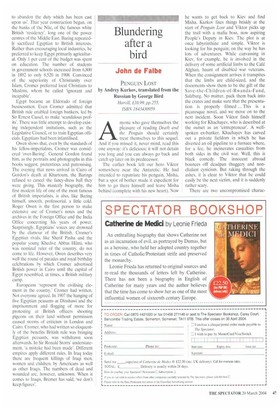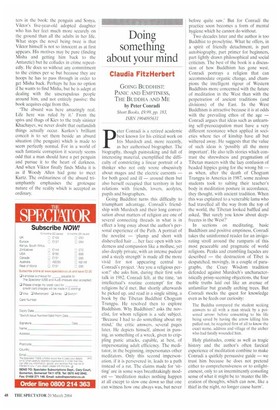Blundering after a bird
John de Falbe
PENGUIN LOST by Andrey Kurkov, translated from the Russian by George Bird Harril1,1110.99, pp.255. ISBN 1843430959 Anyone who gave themselves the pleasure of reading Death and the Penguin should certainly treat themselves to this sequel. And if you missed it, never mind, read this one anyway: it's delicious; it will not detain you long and you can always go back and catch up later on its predecessor.
The earlier book left our hero Viktor somewhere near the Antarctic. He had intended to repatriate his penguin, Misha, but a spot of bother made it expedient for him to go there himself and leave Misha behind (complete with his new heart). Now he wants to get back to Kiev and find Misha. Kurkov fixes things briskly at the start of Penguin Lost and Viktor picks up the trail with a mafia boss, now aspiring People's Deputy in Kiev. The plot is at once labyrinthine and simple. Viktor is looking for his penguin; on the way he has lots of adventures. While canvassing in Kiev, for example, he is involved in the delivery of some artificial limbs to the Cafe Afghan, haunt of disabled war veterans. When the consignment arrives it transpires that the limbs are child-sized, and the documents show them to be the gift of the Save-the-Children-of-Rwanda-Fund, Salzburg. No matter, pack them back into the crates and make sure that the presentation is properly filmed .. This is a picaresque novel, and we move on to the next incident. Soon Viktor finds himself working for Khachayev, who is described at the outset as an 'entrepreneur'. A wellspoken ex-banker, Khachayev has carved out a private fiefdom in which he has diverted an oil pipeline to a furnace where, for a fee, he incinerates casualties from both sides in the civil war. Well, this is black comedy. The innocent abroad bounces off deadpan thuggery and nonchalant cynicism. But raking through the ashes, it is clear to Viktor that he could easily be the next victim, and it is suddenly rather scary.
There are two uncompromised charac ters in the book: the penguin and Sonya, Viktor's five-year-old adopted daughter who has her feet much more securely on the ground than all the adults in her life. What stops the novel being twee is that Viktor himself is not so innocent as at first appears. His motives may be pure (finding Misha and getting him back to the Antarctic) but he colludes in crime repeatedly. He does so without any commitment to the crimes per se but because they are hoops he has to pass through in order to get Misha back. Perhaps he has no option if he wants to find Misha, but he is adept at dealing with the unscrupulous people around him, and not entirely passive: the book acquires edge from this.
The absurd was here amazingly real. Life here was ruled by it.' From the spivs and thugs of Kiev to the truly sinister Khachayev, we never doubt that outlandish things actually occur. Kurkov's brilliant conceit is to set them beside an absurd situation (the penguin) which is made to seem perfectly normal. For in a world of such fantastic corruption it scarcely seems odd that a man should have a pet penguin and pursue it to the heart of darkness. And when Viktor finally finds Misha it is as if Woody Allen had gone to meet Kurtz. The ordinariness of the absurd triumphantly emphasises the grotesque nature of the reality which is accepted as ordinary.



















































































 Previous page
Previous page